2024届高考英语 句子结构课件(共27张PPT)
文档属性
| 名称 | 2024届高考英语 句子结构课件(共27张PPT) | 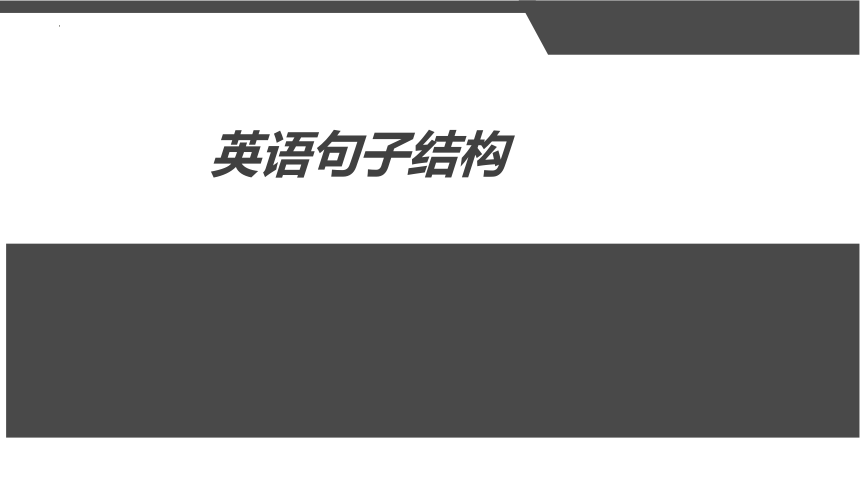 | |
| 格式 | pptx | ||
| 文件大小 | 2.5MB | ||
| 资源类型 | 教案 | ||
| 版本资源 | 通用版 | ||
| 科目 | 英语 | ||
| 更新时间 | 2023-09-12 19:42:45 | ||
图片预览


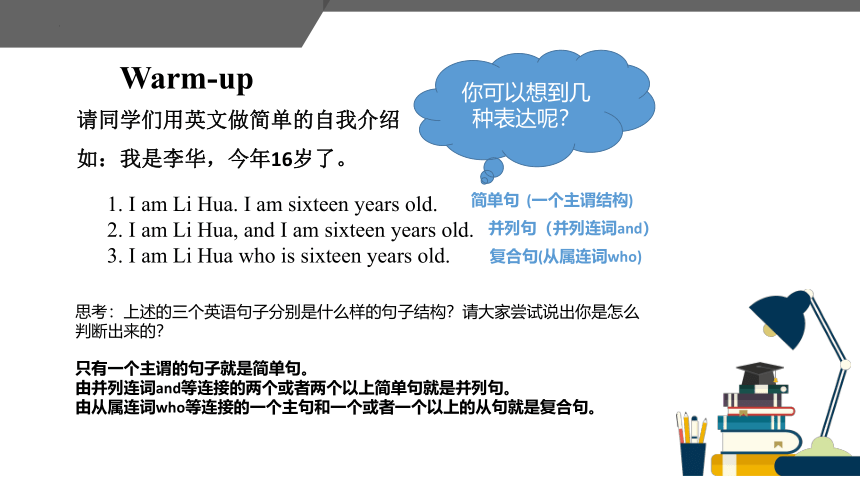
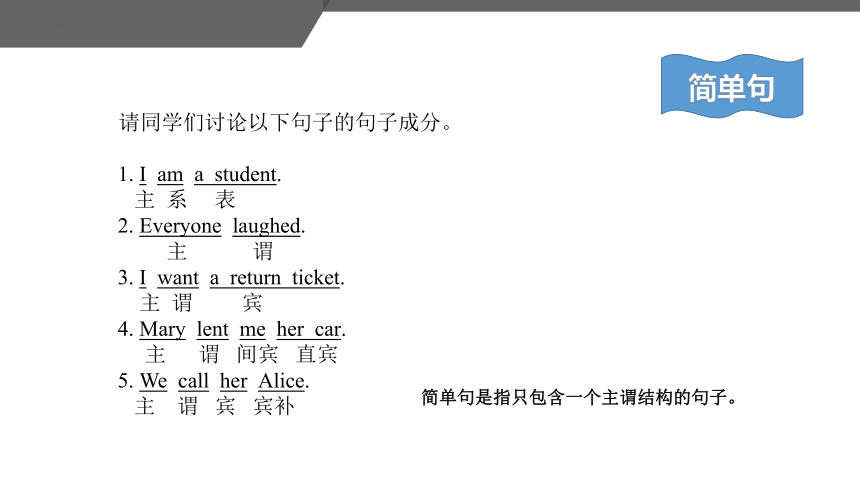
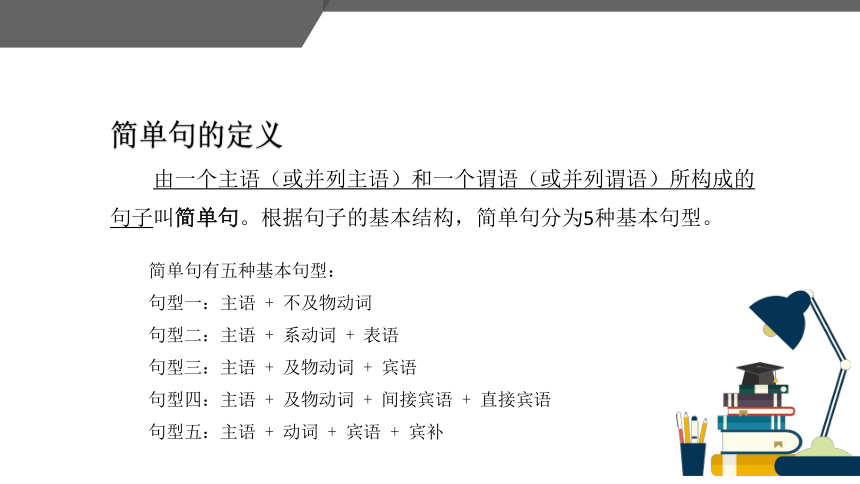
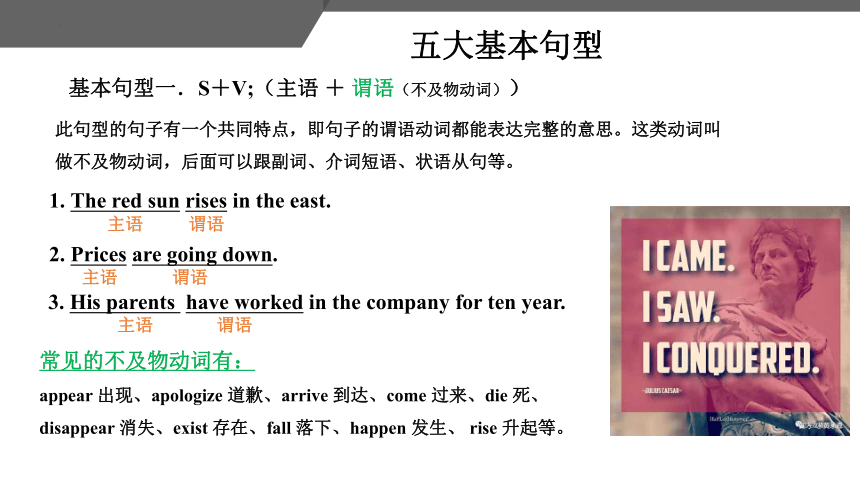
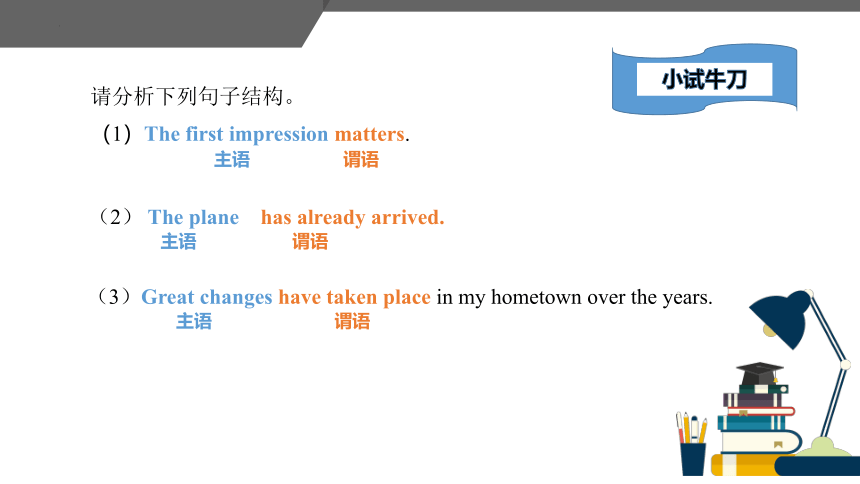
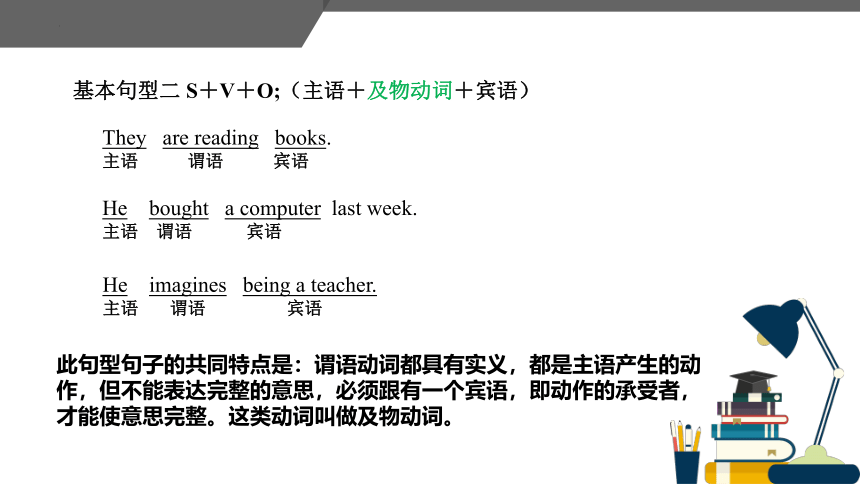
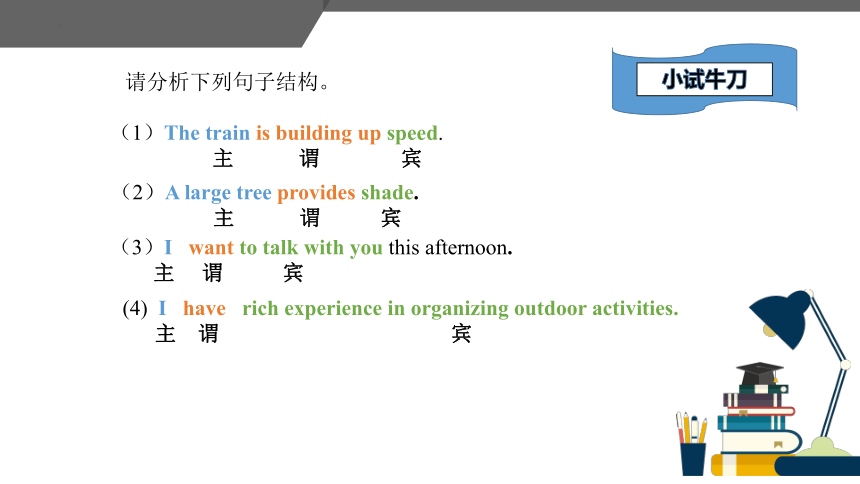
文档简介
(共27张PPT)
英语句子结构
学习目标
02
03
04
能识别五大基本句型、会划分句子成分
积累并列连词并会写并列句
了解复合句,开始学习划分从句
能判断句子结构
01
请同学们用英文做简单的自我介绍
如:我是李华,今年16岁了。
Warm-up
1. I am Li Hua. I am sixteen years old.
2. I am Li Hua, and I am sixteen years old.
3. I am Li Hua who is sixteen years old.
思考:上述的三个英语句子分别是什么样的句子结构?请大家尝试说出你是怎么判断出来的?
只有一个主谓的句子就是简单句。
由并列连词and等连接的两个或者两个以上简单句就是并列句。
由从属连词who等连接的一个主句和一个或者一个以上的从句就是复合句。
你可以想到几种表达呢?
简单句 (一个主谓结构)
并列句(并列连词and)
复合句(从属连词who)
请同学们讨论以下句子的句子成分。
1. I am a student.
2. Everyone laughed.
3. I want a return ticket.
4. Mary lent me her car.
5. We call her Alice.
1. I am a student.
主 系 表
2. Everyone laughed.
主 谓
3. I want a return ticket.
主 谓 宾
4. Mary lent me her car.
主 谓 间宾 直宾
5. We call her Alice.
主 谓 宾 宾补
简单句是指只包含一个主谓结构的句子。
简单句
简单句的定义
由一个主语(或并列主语)和一个谓语(或并列谓语)所构成的句子叫简单句。根据句子的基本结构,简单句分为5种基本句型。
简单句有五种基本句型:
句型一:主语 + 不及物动词
句型二:主语 + 系动词 + 表语
句型三:主语 + 及物动词 + 宾语
句型四:主语 + 及物动词 + 间接宾语 + 直接宾语
句型五:主语 + 动词 + 宾语 + 宾补
1. The red sun rises in the east.
2. Prices are going down.
3. His parents have worked in the company for ten year.
基本句型一.S+V;(主语 + 谓语(不及物动词))
1. The red sun rises in the east.
主语 谓语
五大基本句型
此句型的句子有一个共同特点,即句子的谓语动词都能表达完整的意思。这类动词叫做不及物动词,后面可以跟副词、介词短语、状语从句等。
3. His parents have worked in the company for ten year.
主语 谓语
2. Prices are going down.
主语 谓语
常见的不及物动词有:
appear 出现、apologize 道歉、arrive 到达、come 过来、die 死、disappear 消失、exist 存在、fall 落下、happen 发生、 rise 升起等。
请分析下列句子结构。
(1)The first impression matters.
(2)The plane has already arrived.
(3)Great changes have taken place in my hometown over the years.
(1)The first impression matters.
主语 谓语
(2) The plane has already arrived.
主语 谓语
(3)Great changes have taken place in my hometown over the years.
主语 谓语
小试牛刀
They are reading books.
He bought a computer last week.
He imagines being a teacher.
基本句型二 S+V+O;(主语+及物动词+宾语)
They are reading books.
主语 谓语 宾语
He bought a computer last week.主语 谓语 宾语
此句型句子的共同特点是:谓语动词都具有实义,都是主语产生的动作,但不能表达完整的意思,必须跟有一个宾语,即动作的承受者,才能使意思完整。这类动词叫做及物动词。
He imagines being a teacher.
主语 谓语 宾语
(1)The train is building up speed.
(2)A large tree provides shade.
(3)I want to talk with you this afternoon.
(1)The train is building up speed.
主 谓 宾
(2)A large tree provides shade.
主 谓 宾
(3)I want to talk with you this afternoon.
主 谓 宾
请分析下列句子结构。
(4) I have rich experience in organizing outdoor activities.
(4) I have rich experience in organizing outdoor activities.
主 谓 宾
小试牛刀
My mother is a scientist. 我母亲是个科学家。
My health has grown better. 我的健康状况有所好转。
The food tastes very delicious. 这食物尝起来很香。
My mother is a scientist.
主语 系动词 表语
The food tastes very delicious.这食物尝起来很香。
主语 系动词 表语
My health has grown better. 我的健康状况有所好转。
主语 系动词 表语
基本句型三:S+V+P;(主语+连系动词+表语)
这里的系动词也叫连系动词,不能单独用作谓语,后边必须跟表语,包括形容词、名词、介词短语等,构成系表结构,来说明主语的状况、性质、特征等情况。
连系动词的分类:
1.基本形式:Be (am, is, are) 过去式(was, were)
2.表示“似乎,看起来像”,seem 看起来、appear 相似、显得。
3. 表示变化,become 成为、grow、turn、fall、get、go、come、run 等 用来表示主语变成什么样。
4.感官动词一共5个,包括: look 看起来、sound 听起来、smell 闻起来、taste 尝起来、feel 感觉起来。(注意:感官动词可以接形容词作表语;也可以加 like 接名词。)
5. 表示状态,keep 保持、remain、stay 保持、stand 保持等用来表示主语继续或保持一种状况或态度。
翻译句子。
1.那些图画非常漂亮。
2.汤已经馊了。
3.你们在医院要保持安静。
4.他似乎很伤心。
5.那道食物闻起来很棒。
Those pictures are very beautiful.
The soup has gone bad.
You should remain quiet in the hospital.
He seems to be very sad.
That food really smells good.
小试牛刀
基本句型四:S+V+IO+DO;(主语+及物动词+间接宾语+直接宾语)
(1)I made him a telegram. 我给他发了一封电报。
(2)David showed me the way. 大卫给我带路。
(3)Someone left you this note. 有人给你送来了这张便条。
(1)I made him a telegram. 我给他发了一封电报。
间宾 直宾
(2)David showed me the way. 大卫给我带路。
间宾 直宾
(3)Someone left you this note. 有人给你送来了这张便条。
间宾 直宾
请问间接宾语和直接宾语有什么区别?你是怎么判断的?
间接宾语是谓语动词的间接对象,也就是说谓语动作为谁而做。直接宾语是谓语动词的直接对象。
思考:如果句子意思不变,上述三个句子又可以写成什么呢?
(1)He made a telegram for me.
(2)David showed the way to me.
(3)Someone left this note for you.
(1)He made a telegram for me.
(2)David showed the way to me.
(3)Someone left this note for you.
归纳:to 和for 有什么区别呢?你能想象出需借助to的动词还有哪些?需借助for的动词还有哪些?
答:to侧重动作的方向,表示朝着,向着,对着某人。诸如此类的词还有:/give/bring/lend/offer/pass/promise/return/send/show/teach/tell/write/ask...
for侧重动作的受益者,表示为了某人,替某人。诸如此类的词还有:buy/call/make/get...
请分析下列句子的句子结构并写出其同义句。
(1)She made me a beautiful dress.
(2)He brings me cookies every day.
(3)Mr Johnson taught us English last year.
She made a beautiful dress for me.
She brings cookies to me every day.
Mr Johnson taught English to us last year.
小试牛刀
We must keep our classroom clean and tidy. (我们必须保持教室干净、整洁。)
They painted the door green.
All of us considered him honest.
He has his hair cut once a month.
We must keep our classroom clean and tidy.
主语 谓语 宾语 补语
基本句型五:S+V+O+Oc;(主语+及物动词+宾语+补语)
They painted the door green.
主语 谓语 宾语 补语
All of us considered him honest.
主语 谓语 宾语 补语
He has his hair cut once a month.
主语 谓语 宾语 补语
此种情况,动词虽然跟了宾语,但句子意思不完整,需要跟上一个补足语,对宾语进行解释说明,句子意思才能完整通顺。
请问大家是如何判断出补语的?
请你划分下列句子的句子结构。
(1)I have set the thief free.
(2)The guards ordered us to leave at once.
(3)We hear him read English just now.
(1)I have set the thief free.
主 谓 宾 宾补
(2)The guards ordered us to leave at once.
主 谓 宾 宾补
(3)We hear him read English just now.
主 谓 宾 宾补
小试牛刀
一.请同桌讨论,尝试着判断下列句子的类型。
(1)We fished a day, but we didn’t catch a thing.
(2)He was tired, so he went to bed.
(3)He likes English, and he is good at English.
用并列连词(或者分号)把两个或者几个简单句连起来的句子叫做并列句。并列句的句子结构为简单句+并列连词+简单句。
你还能想出哪些并列连词?试着想一想,写一写!
(1)We fished a day, but we didn’t catch a thing.
(2)He was tired, so he went to bed.
(3)He likes English, and he is good at English.
并列句
这些句子有什么特征?
1. 表示并列关系的并列连词,如both...and...; as well as...; neither...nor.....(既不是...也不是...); either...or...(要么...要么...)等。
(1)The teacher’s name is Smith, and the student’s name is John.
(2)She not only sings but also dances.(她能歌善舞。)
2. 表示转折关系的并列连词,如yet, while, but, still等。
eg: I would like to go, but I was too busy.
3.表示选择关系的并列连词,如either...or...;if等。
Take the chance, or (否则)you will regret.
4.表示因果关系的并列连词,如for; because; so等。
You had better take an umbrella, for it is going to rain.
练习:请用合适的并列连词把每组句子合并成一个并列句。
(1)The child didn’t go out. He was afraid of the dog.
(2)He made a promise. He didn’t keep it.
(3)You must tell the truth. You will be punished.
The child didn’t go out, because he was afraid of the dog.
He made a promise, but he didn’t keep it.
You must tell me the truth, or you will be punished.
一.请判断下列句子的类型。
(1)My suggestion is that we should do more reading.
(2)The news that we are going to have a sports meeting is true.
(3)She is the girl who sings best in our class.
(4)She was reading a book when I came in.
复合句
复合句由一个主句和一个或者一个以上从句所构成的句子,且主句和从句之间用从属连词连接。其基本结构是:主句+从属连词+从句或者从属连词+从句+主句)。
(1)My suggestion is that we should do more reading.
(2)The news that we are going to have a sports meeting is true.
(3)She is the girl who sings best in our class.
(4)She was reading a book when I came in.
你还能想出其他的从属连词么?
whatever/whoever/whom/why/where/whose/when/while/although/so/because/since/so that/as/as though...
从句
请划出下列句子中的从属连词。
(1)I doubt whether they can finish the task on time.
(2)The place which interested me most was the Children’s Palace.
(3)It sounds as if someone was knocking at the door.
(4)The reason is that I miss the train.
(5)If you are busy, please let me know.
请划出下列句子中的从属连词。
(1)I doubt whether they can finish the task on time.
(2)The place which interested me most was the Children’s Palace.
(3)It sounds as if someone was knocking at the door.
(4)The reason is that I miss the train.
(5)If you are busy, please let me know.
Conclusion
回顾一下今天都学了什么?
1. 简单句——五大基本句型
(1)主谓
(2)主谓宾
(3)主系表
(4)主谓直宾间宾
(5)主谓宾补
2. 并列句 (注意并列连词的使用)
3. 复合句 ,以及如何划分从句
请朗读以下句子,划分下列句子的成分,并指出他们分别属于简单句中的哪种。
1. Our country consumes a large number of plastic bags.
2. The super-thin bags are the main source of white pollution.
3. We should encourage people to return to carrying cloth bags.
4. The new rule came out.
5. Environmental groups welcome the new rule.
homework
6. They can stop using plastic bags.
7. What is particularly positive is that it involves public participation.
8. Shops don’t offer free plastic bags to their consumers.
9. Hong Kong and Australia are considering measures to curb plastic bag litter.
10. Chinese consumers have gotten used to free plastic shopping bags.
1.汤姆生病了,他没有来学校。
Tom was ill. Tom didn’t come to school./ Tom was ill so he didn’t come to school./ Tom who didn’t come to school was ill.
2.我看了这本书。它很有帮助。
The novel is very helpful. I read the book./ The novel is very helpful so I read the book. / I read the book which is very helpful.
3.这个演唱会将在明天举行。这个演唱会很有趣。
The concert will be held tomorrow. The concert is very interesting.
The concert will be held tomorrow and it is very interesting.
The concert which will be held tomorrow is very interesting.
4.我是一名学生。我的名字叫汤姆。
I am a student. My name is Tom./ I am a student, and my name is Tom.
/ I am a student who is named Tom.(I am a student named Tom).
一句多译
1.汤姆生病了,他没有来学校。
2.我看了这本书。它很有帮助。
3.这个演唱会将在明天举行。这个演唱会很有趣。
4.我是一名学生。我的名字叫汤姆。
请判断下列句子属于简单句,复合句还是并列句。
(1)We often study Chinese on Friday afternoon.
(2)The boy who offered me his seat is called Tom.
(3)Neither has he changed his mind, nor will he do so.
(4)Both Tom and Jack enjoy country music.
(5)I hate math, while I like English.
(6)The man who has an umbrella in his hand is my uncle.
复合句
并列句
简单句
复合句
简单句
并列句
英语句子结构
学习目标
02
03
04
能识别五大基本句型、会划分句子成分
积累并列连词并会写并列句
了解复合句,开始学习划分从句
能判断句子结构
01
请同学们用英文做简单的自我介绍
如:我是李华,今年16岁了。
Warm-up
1. I am Li Hua. I am sixteen years old.
2. I am Li Hua, and I am sixteen years old.
3. I am Li Hua who is sixteen years old.
思考:上述的三个英语句子分别是什么样的句子结构?请大家尝试说出你是怎么判断出来的?
只有一个主谓的句子就是简单句。
由并列连词and等连接的两个或者两个以上简单句就是并列句。
由从属连词who等连接的一个主句和一个或者一个以上的从句就是复合句。
你可以想到几种表达呢?
简单句 (一个主谓结构)
并列句(并列连词and)
复合句(从属连词who)
请同学们讨论以下句子的句子成分。
1. I am a student.
2. Everyone laughed.
3. I want a return ticket.
4. Mary lent me her car.
5. We call her Alice.
1. I am a student.
主 系 表
2. Everyone laughed.
主 谓
3. I want a return ticket.
主 谓 宾
4. Mary lent me her car.
主 谓 间宾 直宾
5. We call her Alice.
主 谓 宾 宾补
简单句是指只包含一个主谓结构的句子。
简单句
简单句的定义
由一个主语(或并列主语)和一个谓语(或并列谓语)所构成的句子叫简单句。根据句子的基本结构,简单句分为5种基本句型。
简单句有五种基本句型:
句型一:主语 + 不及物动词
句型二:主语 + 系动词 + 表语
句型三:主语 + 及物动词 + 宾语
句型四:主语 + 及物动词 + 间接宾语 + 直接宾语
句型五:主语 + 动词 + 宾语 + 宾补
1. The red sun rises in the east.
2. Prices are going down.
3. His parents have worked in the company for ten year.
基本句型一.S+V;(主语 + 谓语(不及物动词))
1. The red sun rises in the east.
主语 谓语
五大基本句型
此句型的句子有一个共同特点,即句子的谓语动词都能表达完整的意思。这类动词叫做不及物动词,后面可以跟副词、介词短语、状语从句等。
3. His parents have worked in the company for ten year.
主语 谓语
2. Prices are going down.
主语 谓语
常见的不及物动词有:
appear 出现、apologize 道歉、arrive 到达、come 过来、die 死、disappear 消失、exist 存在、fall 落下、happen 发生、 rise 升起等。
请分析下列句子结构。
(1)The first impression matters.
(2)The plane has already arrived.
(3)Great changes have taken place in my hometown over the years.
(1)The first impression matters.
主语 谓语
(2) The plane has already arrived.
主语 谓语
(3)Great changes have taken place in my hometown over the years.
主语 谓语
小试牛刀
They are reading books.
He bought a computer last week.
He imagines being a teacher.
基本句型二 S+V+O;(主语+及物动词+宾语)
They are reading books.
主语 谓语 宾语
He bought a computer last week.主语 谓语 宾语
此句型句子的共同特点是:谓语动词都具有实义,都是主语产生的动作,但不能表达完整的意思,必须跟有一个宾语,即动作的承受者,才能使意思完整。这类动词叫做及物动词。
He imagines being a teacher.
主语 谓语 宾语
(1)The train is building up speed.
(2)A large tree provides shade.
(3)I want to talk with you this afternoon.
(1)The train is building up speed.
主 谓 宾
(2)A large tree provides shade.
主 谓 宾
(3)I want to talk with you this afternoon.
主 谓 宾
请分析下列句子结构。
(4) I have rich experience in organizing outdoor activities.
(4) I have rich experience in organizing outdoor activities.
主 谓 宾
小试牛刀
My mother is a scientist. 我母亲是个科学家。
My health has grown better. 我的健康状况有所好转。
The food tastes very delicious. 这食物尝起来很香。
My mother is a scientist.
主语 系动词 表语
The food tastes very delicious.这食物尝起来很香。
主语 系动词 表语
My health has grown better. 我的健康状况有所好转。
主语 系动词 表语
基本句型三:S+V+P;(主语+连系动词+表语)
这里的系动词也叫连系动词,不能单独用作谓语,后边必须跟表语,包括形容词、名词、介词短语等,构成系表结构,来说明主语的状况、性质、特征等情况。
连系动词的分类:
1.基本形式:Be (am, is, are) 过去式(was, were)
2.表示“似乎,看起来像”,seem 看起来、appear 相似、显得。
3. 表示变化,become 成为、grow、turn、fall、get、go、come、run 等 用来表示主语变成什么样。
4.感官动词一共5个,包括: look 看起来、sound 听起来、smell 闻起来、taste 尝起来、feel 感觉起来。(注意:感官动词可以接形容词作表语;也可以加 like 接名词。)
5. 表示状态,keep 保持、remain、stay 保持、stand 保持等用来表示主语继续或保持一种状况或态度。
翻译句子。
1.那些图画非常漂亮。
2.汤已经馊了。
3.你们在医院要保持安静。
4.他似乎很伤心。
5.那道食物闻起来很棒。
Those pictures are very beautiful.
The soup has gone bad.
You should remain quiet in the hospital.
He seems to be very sad.
That food really smells good.
小试牛刀
基本句型四:S+V+IO+DO;(主语+及物动词+间接宾语+直接宾语)
(1)I made him a telegram. 我给他发了一封电报。
(2)David showed me the way. 大卫给我带路。
(3)Someone left you this note. 有人给你送来了这张便条。
(1)I made him a telegram. 我给他发了一封电报。
间宾 直宾
(2)David showed me the way. 大卫给我带路。
间宾 直宾
(3)Someone left you this note. 有人给你送来了这张便条。
间宾 直宾
请问间接宾语和直接宾语有什么区别?你是怎么判断的?
间接宾语是谓语动词的间接对象,也就是说谓语动作为谁而做。直接宾语是谓语动词的直接对象。
思考:如果句子意思不变,上述三个句子又可以写成什么呢?
(1)He made a telegram for me.
(2)David showed the way to me.
(3)Someone left this note for you.
(1)He made a telegram for me.
(2)David showed the way to me.
(3)Someone left this note for you.
归纳:to 和for 有什么区别呢?你能想象出需借助to的动词还有哪些?需借助for的动词还有哪些?
答:to侧重动作的方向,表示朝着,向着,对着某人。诸如此类的词还有:/give/bring/lend/offer/pass/promise/return/send/show/teach/tell/write/ask...
for侧重动作的受益者,表示为了某人,替某人。诸如此类的词还有:buy/call/make/get...
请分析下列句子的句子结构并写出其同义句。
(1)She made me a beautiful dress.
(2)He brings me cookies every day.
(3)Mr Johnson taught us English last year.
She made a beautiful dress for me.
She brings cookies to me every day.
Mr Johnson taught English to us last year.
小试牛刀
We must keep our classroom clean and tidy. (我们必须保持教室干净、整洁。)
They painted the door green.
All of us considered him honest.
He has his hair cut once a month.
We must keep our classroom clean and tidy.
主语 谓语 宾语 补语
基本句型五:S+V+O+Oc;(主语+及物动词+宾语+补语)
They painted the door green.
主语 谓语 宾语 补语
All of us considered him honest.
主语 谓语 宾语 补语
He has his hair cut once a month.
主语 谓语 宾语 补语
此种情况,动词虽然跟了宾语,但句子意思不完整,需要跟上一个补足语,对宾语进行解释说明,句子意思才能完整通顺。
请问大家是如何判断出补语的?
请你划分下列句子的句子结构。
(1)I have set the thief free.
(2)The guards ordered us to leave at once.
(3)We hear him read English just now.
(1)I have set the thief free.
主 谓 宾 宾补
(2)The guards ordered us to leave at once.
主 谓 宾 宾补
(3)We hear him read English just now.
主 谓 宾 宾补
小试牛刀
一.请同桌讨论,尝试着判断下列句子的类型。
(1)We fished a day, but we didn’t catch a thing.
(2)He was tired, so he went to bed.
(3)He likes English, and he is good at English.
用并列连词(或者分号)把两个或者几个简单句连起来的句子叫做并列句。并列句的句子结构为简单句+并列连词+简单句。
你还能想出哪些并列连词?试着想一想,写一写!
(1)We fished a day, but we didn’t catch a thing.
(2)He was tired, so he went to bed.
(3)He likes English, and he is good at English.
并列句
这些句子有什么特征?
1. 表示并列关系的并列连词,如both...and...; as well as...; neither...nor.....(既不是...也不是...); either...or...(要么...要么...)等。
(1)The teacher’s name is Smith, and the student’s name is John.
(2)She not only sings but also dances.(她能歌善舞。)
2. 表示转折关系的并列连词,如yet, while, but, still等。
eg: I would like to go, but I was too busy.
3.表示选择关系的并列连词,如either...or...;if等。
Take the chance, or (否则)you will regret.
4.表示因果关系的并列连词,如for; because; so等。
You had better take an umbrella, for it is going to rain.
练习:请用合适的并列连词把每组句子合并成一个并列句。
(1)The child didn’t go out. He was afraid of the dog.
(2)He made a promise. He didn’t keep it.
(3)You must tell the truth. You will be punished.
The child didn’t go out, because he was afraid of the dog.
He made a promise, but he didn’t keep it.
You must tell me the truth, or you will be punished.
一.请判断下列句子的类型。
(1)My suggestion is that we should do more reading.
(2)The news that we are going to have a sports meeting is true.
(3)She is the girl who sings best in our class.
(4)She was reading a book when I came in.
复合句
复合句由一个主句和一个或者一个以上从句所构成的句子,且主句和从句之间用从属连词连接。其基本结构是:主句+从属连词+从句或者从属连词+从句+主句)。
(1)My suggestion is that we should do more reading.
(2)The news that we are going to have a sports meeting is true.
(3)She is the girl who sings best in our class.
(4)She was reading a book when I came in.
你还能想出其他的从属连词么?
whatever/whoever/whom/why/where/whose/when/while/although/so/because/since/so that/as/as though...
从句
请划出下列句子中的从属连词。
(1)I doubt whether they can finish the task on time.
(2)The place which interested me most was the Children’s Palace.
(3)It sounds as if someone was knocking at the door.
(4)The reason is that I miss the train.
(5)If you are busy, please let me know.
请划出下列句子中的从属连词。
(1)I doubt whether they can finish the task on time.
(2)The place which interested me most was the Children’s Palace.
(3)It sounds as if someone was knocking at the door.
(4)The reason is that I miss the train.
(5)If you are busy, please let me know.
Conclusion
回顾一下今天都学了什么?
1. 简单句——五大基本句型
(1)主谓
(2)主谓宾
(3)主系表
(4)主谓直宾间宾
(5)主谓宾补
2. 并列句 (注意并列连词的使用)
3. 复合句 ,以及如何划分从句
请朗读以下句子,划分下列句子的成分,并指出他们分别属于简单句中的哪种。
1. Our country consumes a large number of plastic bags.
2. The super-thin bags are the main source of white pollution.
3. We should encourage people to return to carrying cloth bags.
4. The new rule came out.
5. Environmental groups welcome the new rule.
homework
6. They can stop using plastic bags.
7. What is particularly positive is that it involves public participation.
8. Shops don’t offer free plastic bags to their consumers.
9. Hong Kong and Australia are considering measures to curb plastic bag litter.
10. Chinese consumers have gotten used to free plastic shopping bags.
1.汤姆生病了,他没有来学校。
Tom was ill. Tom didn’t come to school./ Tom was ill so he didn’t come to school./ Tom who didn’t come to school was ill.
2.我看了这本书。它很有帮助。
The novel is very helpful. I read the book./ The novel is very helpful so I read the book. / I read the book which is very helpful.
3.这个演唱会将在明天举行。这个演唱会很有趣。
The concert will be held tomorrow. The concert is very interesting.
The concert will be held tomorrow and it is very interesting.
The concert which will be held tomorrow is very interesting.
4.我是一名学生。我的名字叫汤姆。
I am a student. My name is Tom./ I am a student, and my name is Tom.
/ I am a student who is named Tom.(I am a student named Tom).
一句多译
1.汤姆生病了,他没有来学校。
2.我看了这本书。它很有帮助。
3.这个演唱会将在明天举行。这个演唱会很有趣。
4.我是一名学生。我的名字叫汤姆。
请判断下列句子属于简单句,复合句还是并列句。
(1)We often study Chinese on Friday afternoon.
(2)The boy who offered me his seat is called Tom.
(3)Neither has he changed his mind, nor will he do so.
(4)Both Tom and Jack enjoy country music.
(5)I hate math, while I like English.
(6)The man who has an umbrella in his hand is my uncle.
复合句
并列句
简单句
复合句
简单句
并列句
